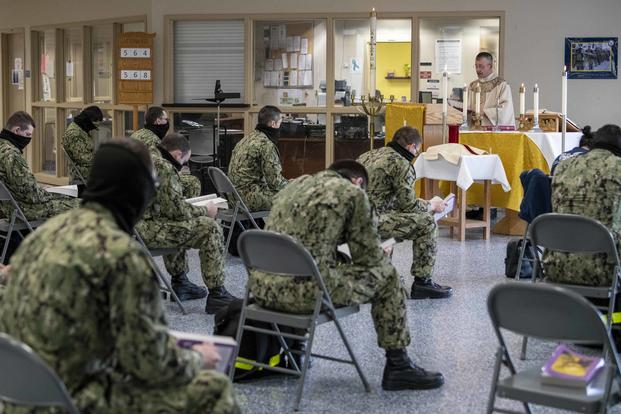Sailors can now worship at drive-in religious services off base but cannot go inside, according to COVID-19 restrictions the Navy reaffirmed Tuesday.
The policy against attending indoor religious services off base to prevent the spread of the novel coronavirus has brought complaints from chaplains and two House lawmakers, as well as the threat of a lawsuit. But the Navy is sticking with the restrictions that began in March.
Read Next: Here's How the Navy's New PRT Plank Event Will Be Scored
The possibility that the service might ease the restrictions was raised when Navy-wide policy was updated June 23 to allow "in-residence gatherings regardless of their nature assuming they comply with the 10-guest limitation."
In addition, the updated order removed the word "social" in defining the gatherings, suggesting they might be used for religious purposes.
However, the service said the updated guidance was "not new" and "simply reinforces previously issued Defense Department and Navy guidance that applies to Navy commands in the continental U.S."
In a statement, Capt. Sarah Self-Kyler, spokeswoman for Fleet Forces Command, said the Navy "works to support every sailor's religious practices to the broadest extent possible within the bounds of military readiness, health and safety."
She added that the restrictions on off-base, indoor religious services are "essential to safeguarding the health, safety and welfare of our service members and ensuring the Navy's operational readiness."
The policy has drawn public attention after Air Force Maj. Daniel Schultz, a chaplain assigned to the Naval Postgraduate School in California, and five anonymous sailors protested on the ground of religious freedom.
The policy prohibits Schultz from participating in the off-base services of his church and amounts to a limitation on his religious freedom, said Michael Berry, general counsel to First Liberty Institute, a Texas-based legal firm focused on religious freedom issues.
The institute argues that the Navy policy goes against President Donald Trump's May 2017 executive order on free speech and religious liberty, which stated it is "the policy of the executive branch to vigorously enforce Federal law's robust protections for religious freedom."
Berry told Military.com that he’d heard unconfirmed reports that the Navy was looking into changing policy, but "we haven't seen anything in writing."
He said he had filed what he called a "religious accommodation request" with the Navy but had yet to receive a response. Berry said the institute is prepared to "explore all options" to get the restrictions lifted and has not ruled out a lawsuit.
Roman Catholic Archbishop Timothy Broglio, the Archbishop of the Military Services, has also spoken out against the Navy policy.
In a July 5 statement, Broglio said the Navy's restrictions are "particularly odious to Catholics, because frequently there is no longer a Catholic program on naval installations due to budgetary constraints or many installation chapels are still closed -- even though many of them could well ensure appropriate social distancing."
Broglio said he had taken his concerns to the Navy Chief of Chaplains' Office. "They have been unable to offer any relief from these provisions," he said. "My attempt to contact the Chief of Naval Operations [Adm. Mike Gilday] has not even been acknowledged."
The Navy's statements on the issue indicated no letup; installations in the U.S. are at Health Protection Condition (HPCON) C, which restricts travel to home and work, except for stops for essential services.
"These measures prohibit sailors from attending off-base indoor religious services, and remain necessary given existing medical information about the current rise in COVID-19 cases in certain locations throughout the country," according to a Navy statement. "Medical evidence confirms that large public gatherings present a significant risk of infection from COVID-19."
However, local commanders can request a change in the force protection level to HPCON B if there is a downward trajectory of documented COVID-19 cases or of positive tests as a percent of total tests over the preceding 14-day period, as well as a downward trajectory in influenza-like illnesses and COVID-like cases.
To date, 19 Navy installations are at HPCON B and more are expected to be added to the list later this week, a spokesman for Fleet Forces Command said.
Under HPCON B, "service members have the opportunity to return to activities such as dining out, attending public gatherings, and frequenting retail establishments," the spokesman said.
But it is unclear as yet whether they also will be allowed to attend religious services off base.
In a July 2 letter to Defense Secretary Mark Esper, Reps. Doug Collins, R-Georgia, and Doug Lamborn, R-Colorado, urged him to lift the restrictions on off-base religious services.
"While we can all agree that the health and safety of our troops is critical during the ongoing public health crisis, singling out religious gatherings while allowing other activities and unrestricted social gatherings to take place is unlawful," they wrote.
-- Richard Sisk can be reached at Richard.Sisk@Military.com.
Related: Navy Cancels More Fitness Tests as US Sees Troubling Rise in COVID-19 Cases












